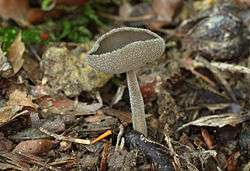Helvella macropus
Helvella macropus is a species of fungus in the family Helvellaceae of the order Pezizales. Ascocarps are found in summer and autumn in woodland, usually (though not exclusively) associated with broad-leaved trees. The slender stem, up to 5 centimeters high, supports a cup shaped cap, the whole fruiting body being pale grey or brown, the inner (hymenial) surface of the cup usually being darker.[1][2] It is inedible.[3]
| Helvella macropus | |
|---|---|
 | |
| Scientific classification | |
| Kingdom: | |
| Division: | |
| Subdivision: | |
| Class: | |
| Order: | |
| Family: | |
| Genus: | |
| Species: | H. macropus |
| Binomial name | |
| Helvella macropus (Pers.) P. Karst | |
Distribution
This species has a wide distribution in the northern hemisphere, having been recorded in Europe, North and Central America and also in China,[4] and Japan.[5]
gollark: I've never actually had to do either of those, but my wireless card is a pretty common one.
gollark: My more Haskell-liking friend wrote some sort of strange imperative DSL in Haskell a while ago for unfathomable purposes, it's surprisingly flexible.
gollark: What might actually be useful is GPS with signed responses to prevent spoofing.
gollark: > Oh no, they'll have to spend a whole 32 gold making their own.More realistically, oh no, they will have to spend about 10 seconds sniffing for the password.
gollark: You could probably do auth vaguely decentrally, if you don't mind not having a centralized username/UUID registry.
References
- Jordan, Michael (2004). The Encyclopedia of Fungi of Britain and Europe. Frances Lincoln Publishers. p. 54. ISBN 978-0-7112-2379-0.
- Buczacki, Stefan (1992). Collins Guide to Mushrooms and Toadstools of Britain and Europe. HarperCollins. p. 217. ISBN 0-00-219978-5.
- Phillips, Roger (2010). Mushrooms and Other Fungi of North America. Buffalo, NY: Firefly Books. p. 367. ISBN 978-1-55407-651-2.
- Zhuang WY. (2004). "Preliminary survey of the Helvellaceae from Xinjiang, China". Mycotaxon. 90 (1): 35–42.
- Nagao H. (2002). "Fungal flora in Chiba Pref., central Japan (III) Ascomycetes: Plectomycetes and Discomycetes". Journal of the Natural History Museum and Institute Chiba (in Japanese). 5: 111–32.
This article is issued from Wikipedia. The text is licensed under Creative Commons - Attribution - Sharealike. Additional terms may apply for the media files.